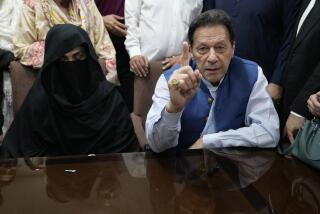Indonesian Cleric Convicted
- Share via
JAKARTA, Indonesia — Radical cleric Abu Bakar Bashir was found guilty Tuesday of taking part in treasonous activity but was acquitted of a more serious charge that he headed the Jemaah Islamiah terrorist network.
A five-judge panel, which also found Bashir guilty of forging an immigration document, sentenced the 65-year-old Indonesian cleric to four years in prison, less the 10 1/2 months he spent in jail awaiting trial.
Despite testimony from several admitted Jemaah Islamiah members who named Bashir as the group’s spiritual leader, the judges concluded that there was insufficient evidence to prove he headed the network.
Instead, the judges concluded that he took part in the group’s treasonous activity by preaching holy war to its members, sending some for military training in Afghanistan and the southern Philippines, and approving the bombing of crowded Indonesian churches on Christmas Eve 2000.
“There is not enough evidence to prove that the defendant led and organized [a conspiracy] to overthrow the government,” Judge Mohammed Saleh told the court during a daylong reading of the panel’s findings.
Authorities say Jemaah Islamiah is closely associated with the Al Qaeda terrorist network and responsible for dozens of bombings that have killed more than 260 people in Indonesia and the Philippines.
Among its most high-profile attacks were the nightclub bombings in Bali last October that killed 202 people, the JW Marriott Hotel bombing last month in Jakarta, the capital, that killed 12, and the synchronized Christmastime church bombings across Indonesia in 2000 that killed 19.
According to documents confiscated by police, Jemaah Islamiah’s strategy is to create chaos that would lead to the collapse of the Indonesian government and the formation of a Taliban-style state in Southeast Asia governed by Islamic law.
More than 200 Jemaah Islamiah members have been arrested in the region, including some of the alleged organizers of the Bali bombings, but hundreds more remain on the loose, including many trained to make bombs.
Neighboring governments, including those of Singapore and Malaysia, identified Bashir as the leader of Jemaah Islamiah early last year, but it wasn’t until a week after the Bali blast that Indonesian authorities arrested him. He has not been charged in that attack.
The trial was closely watched by the international community as a test of Indonesia’s willingness to go after alleged terrorist leaders. Bashir maintains that he is not a terrorist and is merely advocating that Muslims follow the strict Islamic code known as Sharia. He praises Osama bin Laden but denies that Jemaah Islamiah exists.
He contends that the bombings in Indonesia were carried out by the U.S. to blacken the name of Islam.
“The Bali and the Marriott bombing incidents are definitely the work of the CIA,” Bashir told the court last month. “All of these are the scenario created by the United States with an aim to terrorize Muslims from their efforts to uphold Sharia.”
Bashir has been involved in organizing Indonesia’s radical Muslim movement since the 1970s, when he was sent to prison for four years on treason charges along with another militant cleric, Abdullah Sungkar.
They fled to Malaysia in 1985 rather than return to prison and continued organizing their movement. They founded Jemaah Islamiah in the early 1990s, bringing together dozens of militants who had trained at camps in Afghanistan.
Bashir and Sungkar returned to Indonesia in 1999 after the fall of the Suharto dictatorship. Sungkar died soon after.
At least 17 men accused of carrying out Jemaah Islamiah bombings are graduates of the Al Mukmin Islamic boarding school the pair founded in 1971 in central Java, according to a recent report by the International Crisis Group, a Brussels-based think tank.
Bashir has admitted knowing many of those arrested on suspicion of involvement in the bombings and acknowledges that some were his students or attended his lectures.
Prosecutors charged that Bashir plotted with other members of the group to carry out the church bombings and assassinate Indonesian President Megawati Sukarnoputri when she was serving as vice president. The strongest evidence against the cleric was the testimony of three Jemaah Islamiah members who had been arrested in Singapore and spoke to the court by videoconference. They identified Bashir as the leader of Jemaah Islamiah and expressed dismay that he was not telling the truth about the organization.
In its findings, the court concluded that Jemaah Islamiah exists as an organization and is seeking to overthrow the government. Bashir participated in some of the group’s activities, the court found.
“The defendant had knowledge of an organization that is trying to topple the government,” Judge Saleh told the court. “That is why the secondary charge has been proved.”
The court also found that Bashir violated immigration law when he returned to Indonesia in 1999 and obtained new citizenship papers by forging a document that said he had lived in the country during the 14 years he was in self-imposed exile.
Bashir addressed the court briefly, saying he would appeal. “The judge’s decision is tyranny because my struggle to uphold Islamic law is called treason,” he said.
About 500 police officers guarded the courtroom and watched over hundreds of Bashir’s supporters who had come to witness the decision. Nearly 20 of Bashir’s 68 attorneys also were on hand.
Before the hearing began, the court allowed Bashir to address his agitated backers. He urged them to remain calm, whatever the trial’s outcome.
“Believe this, no matter how many years the judges give me, we will win,” he told the crowd. “As long as we defend God’s laws, we will win.”
*
Paddock reported from Brisbane, Australia, and Sudarsono from Jakarta.
More to Read
Sign up for Essential California
The most important California stories and recommendations in your inbox every morning.
You may occasionally receive promotional content from the Los Angeles Times.










